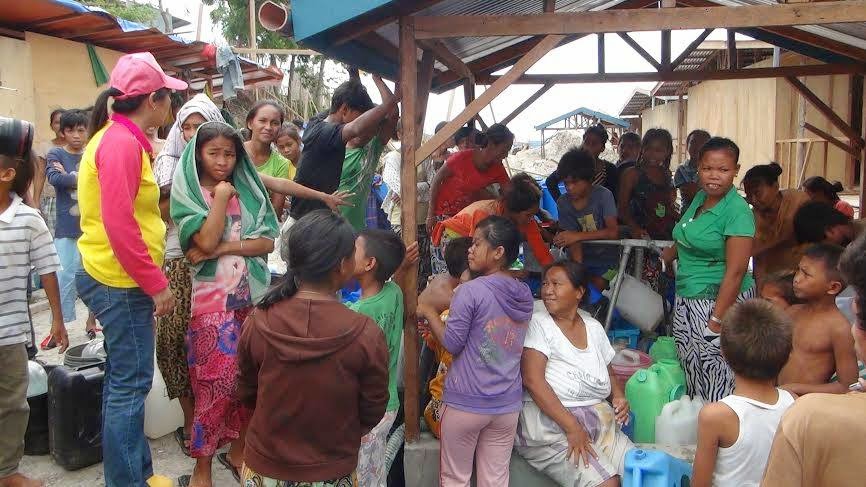
ZAMBOANGA CITY (Mindanao Examiner / July 6, 2014) – A Filipino lawmaker Carlos Zarate called on the Aquino administration to seriously reassess its priorities and address immediately the appalling humanitarian condition of the more than 100,000 war refugees who are in different shelters in Zamboanga City in southern Philippines.
The refugees were displaced by three weeks of fighting in September last year between Moro National Liberation Front rebels and security forces. The fighting killed and wounded over 400 people and displaced over 120,000 residents.
More than 130 refugees have so far died from diseases in evacuation centers since last year.
“Dapat singilin ang gobyernong Aquino sa pagkamatay ng mga evacuees dahil sa pagpapabaya ng estado para ibigay ang mga batayang serbisyong panlipunan na kailangan nila tulad ng malinis na tubig, maayos na tirahan at relokasyon sa isang komunidad na may access sa kabuhayan.”
“Makikita rin natin na naka-angkla ang hindi pagpapabalik sa mga evacuees sa kanilang mga tirahan dahil sa no-build zone policy ng administrasyong Aquino na nakapaling sa interes ng mga korporatista at malalaking kapitalista,”
Zarate said in a statement sent to the regional newspaper Mindanao Examiner.
He also condemned the government’s “gross inefficiency in responding to the effects of so-called Zamboanga siege.”
He said many refugees were also reported to be sick and afflicted by different forms of ailments that were aggravated by the unsanitary conditions in the evacuation centers and reports also of many rape cases in the shelters.
Zarate said the refugees still have no permanent housing, lack food support and rice supply, medical and financial support and sources of livelihood despite huge funding released by the government to address these problems and alleviate the conditions of evacuees.
He said Congress last year allocated P14 billion as supplemental fund for the rehabilitation and reconstruction of devastated areas due to natural and man-made calamities, including the aftermath of the Zamboanga siege. And this year, some P20 billion was also allocated as Rehabilitation and Reconstruction Program Fund and another P13 billion from the National Disaster and Risk Reduction Management Fund, and a stand-by P80 billion unprogrammed fund for reconstruction and rehabilitation.
Zarate said various movements in Zamboanga City have already been formed to press the government to act on the poor conditions of the refugees. He said the group called Bangon Zamboanga, composed of refugees themselves, and the Al Muhminat Group, which is comprised of mostly of Muslim women and mothers, have condemned the inaction of the government in providing them with sufficient support and access to basic social services.
He said the Moro-Christian People’s Alliance have already claimed that the harsh situation poses serious distraction in fulfilling our Ramadan obligations of deep meditation and worship by reading the Holy Quran.
Because of these problems and mounting complaints, Zarate said they will call for an investigation on the condition of refugees in evacuation centers designated by the Department of Social Welfare and Development. He said the House Committee on Social Services would conduct the investigation “The Aquino government should reassess its priorities. It must be accountable for its continuing negligence in providing to basic social services and immediate permanent housing to the people displaced by the September Zamboanga siege,” Zarate said.
Senator Nancy Binay has earlier filed Resolution 566 urging the Senate to investigate the reported deaths of the refugees and look into the health of children living in filthy evacuation centers and lack medical and emergency facilities there.
The International Committee of the Red Cross also said the poor sanitation practices and unsuitable facilities in evacuation centers create ideal conditions for the spread of disease.
“Progress has been made in relocating a number of displaced people to transitional sites around the city. Nevertheless, efforts should continue to ensure that services such as water supply and sanitation are provided before moving people to these transitional sites. Especially now with the start of the rainy season, which will put additional strain on an already vulnerable population,” said Pascal Mauchle, head of the delegation of the ICRC in the Philippines.
In a bid to improve the overall health situation, the ICRC said it is refurbishing health stations damaged in the fighting and providing medicines, other supplies and technical and financial support to the local health authorities and the Zamboanga City Medical Center.
In May, the ICRC also set up a nutrition program for malnourished children under 5 years of age and for pregnant and lactating women with a view to reducing the number of preventable deaths. So far 225 children and 32 women are being followed under this program. In addition, multipurpose halls are being built in three evacuation centers to carry out hygiene promotion, nutrition and health-care activities, it said.
Zamboanga City Mayor Maria Isabella Salazar said the government has been busy working on the rehabilitation of areas affected by the siege. She said construction of housing projects is now ongoing while thousands of refugees have been transferred to various transitory sites which are far better than evacuation centers.
She said the National Housing Authority have started the construction in June of at least 172 permanent housing units, duplex loftable-type, under the so-called Zamboanga City Roadmap to Recovery and Reconstruction or Z3R Plan.
Salazar also ordered the implementation of necessary sanitation measures at the Joaquin Enriquez Memorial Sports Complex where thousands of refugees are still staying while waiting for new transitory sites.
She said at least 30 bunkhouses for evacuees have been completed in June and construction of the boardwalk and other facilities such as additional latrines and community kitchen, including installation of light and potable water system, and temporary health centers.
“We are continuously coordinating with the national government for the Z3R implementation and to ensure that the houses and other facilities will be constructed within the 18-month time frame set by Malacañang,” she said. (Mindanao Examiner)
